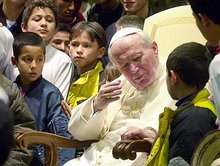Reflections of the U.S. Catholic Bishops
For many of us, Labor Day comes as a much-needed break from the rigors of our busy work weeks. As we gather with friends and family this Labor
Day, we are also reminded of our Catholic responsibility to honor and support those who work hard to keep our society and our economy healthy—especially those who are struggling to support their own families. This special duty to the poor is a part of our Church’s tradition called Catholic social teaching.
As the U.S. Catholic Bishops write, “Catholic social teaching is a central and essential element of our faith. Its roots are in the Hebrew prophets who announced God’s special love for the poor and called God’s people to a covenant of love and justice. It is a teaching founded on the life and words of Jesus Christ, who came ‘to bring glad tidings to the poor. . . liberty to captives. . .recovery of sight to the blind’ (Lk 4:18-19), and who identified himself with ‘the least of these,’ the hungry and the stranger (cf. Mt 25:45). Catholic social teaching is built on a commitment to the poor. This commitment arises from our experiences of Christ in the Eucharist. As the Catechism of the Catholic Church explains, ‘To receive in truth the Body and Blood of Christ given up for us, we must recognize Christ in the poorest, his brethren (No. 1397??? What is this?).’”
Below are three important themes of Catholic social teaching we should keep in mind as we celebrate Labor Day this year:
Call to Family, Community, and Participation In a global culture driven by excessive individualism, our tradition proclaims that the person is not only sacred but also
social. How we organize our society in economics and politics, in law and policy directly affects human dignity and the capacity of individuals to grow in community. The family is the central social institution that must be supported and
strengthened, not undermined. While our society often exalts individualism, the Catholic tradition teaches that human beings grow and achieve fulfillment in community.
We believe people have a right and a duty to participate in society, seeking together the common good and wellbeing of all, especially the poor and vulnerable. Our Church teaches that the role of government and other institutions is to protect human life and human dignity and promote the common good.
Option for the Poor and Vulnerable
In a world characterized by growing prosperity for some and pervasive poverty for others, Catholic teaching proclaims that a basic moral test is how our most vulnerable members are faring. In a society marred by deepening divisions between rich and poor, our tradition recalls the story of the Last Judgement (Mt 25:31-46) and instructs us to put the needs of the poor and vulnerable first.
The Dignity of Work and the Rights of Workers
In a marketplace where too often the quarterly bottom line takes precedence over the rights of workers, we believe that the economy must serve people, not the other way around. Work is more than a way to make a living; it is a form of continuing participation in God’s creation.
We are called to justice in everyday life.
Catholicism does not call us to abandon the world but to help shape it. Catholics are
everywhere in this society. We are corporate executives and migrant farm workers, politicians and welfare recipients, educators and day care workers, tradesmen and farmers, office and factory workers, union leaders and small-business owners. Our entire community of faith must help Catholics to be instruments of God’s grace and creative power in business and politics, in factories and offices, in homes and schools, and in all the events of daily life. Social justice and the common good are built up or torn down day by day in the countless decisions and choices we make. This vocation to pursue justice is not simply an individual task; it is a call to work with
others to humanize and shape the institutions that touch so many people. The lay vocation for justice in the world cannot be carried forward alone but only as members of a community called to be the “leaven” of the gospel. Our families are the starting point and the center of a vocation for justice. How we treat our parents, spouses, and children is a reflection of our commitment to Christ’s love and justice. We demonstrate our commitment to the gospel by how we spend our time and money, and whether our family life includes an ethic of charity, service, and action for justice. The lessons we teach our children through what we do as well as what we say determine whether they care for the “least among us” and are committed to work for justice.
Workers are called to pursue justice.
In the Catholic tradition, work is not a burden, not just how we make a living. Work is a way of supporting our family, realizing our dignity, promoting the common good and participating in God’s creation. This means often doing the ordinary well, making the most of our talents and opportunities, treating others fairly and with dignity, and working with integrity and creativity. Believers should be encouraged to choose their work based on how they can best use the gifts God has given them. Decisions made at work can make important contributions to an ethic of justice. Catholics have
the often difficult responsibility of choosing between competing values in the workplace. This is a measure of holiness. Associations that enable workers, owners, or managers to pursue justice often make the witness of the individual more effective.
Monday, September 1, 2008
Labor Day: Sharing Catholic Social Teaching: Challenges and Directions
Posted by
Anonymous
at
2:30 PM
![]()
Labels: Catholic Social Teaching, Labor Day
Subscribe to:
Comment Feed (RSS)










|